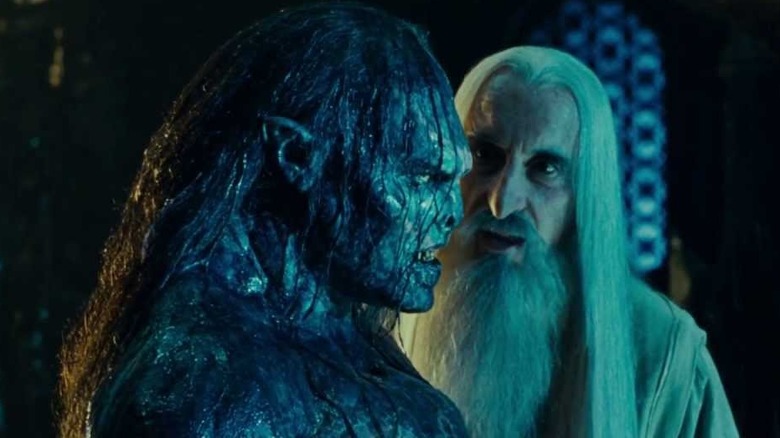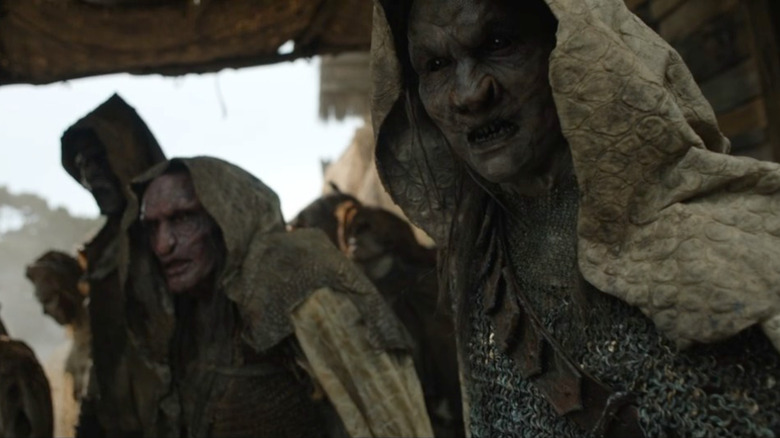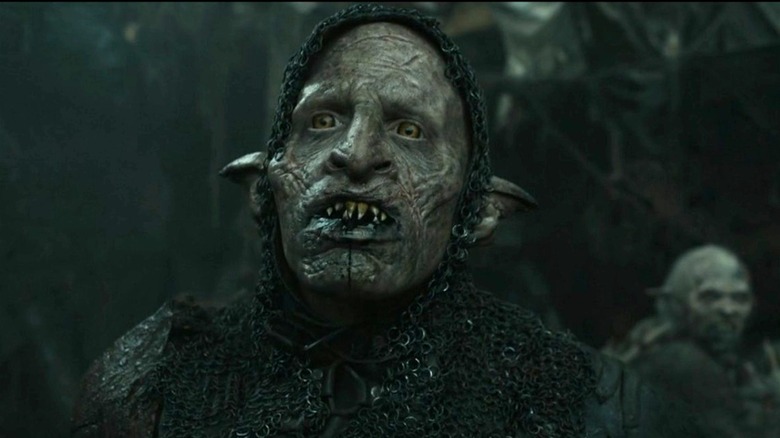Are The Orcs In Rings Of Power ‘Woke’? A Lord Of The Rings Controversy, Explained
“The Rings of Power” Season 2 is officially here, and with it, the intense polarization and controversy within the Tolkien community has resumed with just as much fervor as Season 1. (Guys, this could be a Golden Age for Middle-earth if we all just toned it down a bit!) One of the biggest debates soaking up social media halfway into the season is the presence of an Orc family in Episode 3, “The Eagle and the Sceptre.” In the scene, an Orc played by serial prosthetic actor Robert Strange (who has played multiple Orcs throughout the show) sees the approach of the terrifying hill troll Damrod and instinctively pulls back, cradling his wife and her swaddled Orc baby in his arms. This Orc family unit is the first adapted iteration we’ve ever seen of a familial element in their culture, and, predictably, it set the opinionated Internet on fire.
One example is X user @AgainstTime777, who said, “Rings of Power Season Two is comically bad. They actually try to humanize the orcs. Apparently there are orc women who are waiting for their husbands to get back from war. Tolkien literally wrote that they are grown like plants and only live to kill. So glad I didn’t pay to see.” (There’s plenty of other vitriolic-level stuff like this out there, but you get the idea.) Others were less intense but still skeptical. Film critic Gavia Baker-Whitelaw, for instance, said, “i view The Rings of Power as a very unadventurous and conservative show, creatively speaking, so its always wild to discover that Tolkien diehards are frothing with rage over innocuous background details like ‘orcs can have kids now.'”
Let’s take a closer look at the criticism, where Orcs come from, and why the “woke” Orcs accusations against the show don’t really hold water.
Orcish origins
Here’s a question. Where do Orcs come from? If you don’t have an answer, that’s fine, because neither did Tolkien. The author spent his life going back and forth over what Orcs were and where they came from. Because of this, some of the backlash against Orcish families is rooted in real facts. For instance, early on, Tolkien dabbled with the idea that Orcs just came from the mud. In “The Book of Lost Tales” (an early version of “The Silmarillion), he said, “for all that race were bred by [Morgoth] of the subterranean heats and slime. Their hearts were of granite and their bodies deformed.” When trying to explain what exactly the Orcs were, Tolkien also considered making them puppet-like creatures and soulless animals.
However, the most prominent explanation comes from “The Silmarillion,” which states that the Elves believe the Orcs are corrupted Elves (an account that helps explain Adar’s origin in the show.) Other, later possibilities included a heavy emphasis on Orcs being corrupted Humans.
Much of the Orc origin conundrum also hinges on the question of whether Orcs are redeemable creatures. For instance, X user Rock solid vehemently pointed out, “Tolkien SPECIFICALLY wrote the orcs to be irredeemably evil, they are born from evil to serve evil. Trying to make them out to be a marginalized group is beyond stupid. This is like spitting on Tolkien’s writing and legacy.” However, we at TheShockNews would like to challenge that notion. At the very least, the jury is out on the question, and our own research and studying of the source material has led us to believe that, if anything, it’s highly likely that Orcs were, indeed, redeemable. (Trust us. That is a long, dark, and complicated debate.)
Orc families and reproductive activity
Okay, so Orc origins are complicated, and they may or may not have been redeemable. What about their culture and family units, though? Did they have them? Did any of Tolkien’s writings describe them reproducing in a way that wasn’t just growing like plants or being churned out of mud?
In the “Silmarillion” explanation that they come from Elves, the book adds, “For the Orcs had life and multiplied after the manner of the Children of Ilúvatar.” Those “Children of Illúvatar” are Elves and Men who are created purely by the God-like Creator himself. This naturally implies that there are Orc families, too, and Tolkien said as much — though not directly. Instead, we’re left to cobble together the hints.
For example, we get a reference to an Orc child in “The Hobbit” book, where it says, “Only a few hours ago [Gollum] had worn [the One Ring], and caught a small goblin-imp. How it squeaked!” In a letter in 1963 to one “Mrs Munby,” Tolkien also explicitly addressed the question of Orc women and non-warfront Orcish culture, saying, “There must have been orc-women. But in stories that seldom if ever see the Orcs except as soldiers of armies in the service of the evil lords we naturally would not learn much about their lives. Not much was known.”
In “The Two Towers,” Treebeard also makes a more disturbing reference to Orcish reproduction. There, he surmises that Saruman’s Uruk-hai may have been created by blending the races of Orcs and Men.
The Rings of Power isn’t watering down Orcish evil
Okay, so Orc families are both a natural and legitimate part of the Middle-earth landscape. The lingering question then is, does including them in the show when Tolkien didn’t do so in his stories negatively impact the narrative? Does it humanize them in a way that detracts from the Middle-earth experience?
Showrunners JD Payne and Patrick McKay addressed this question in a TV Insider interview, where they said that Robert Strange’s character is an “orc with an arc” — he even has a name: Glüg. The lead creatives for the show added that after digging into the mythology, they decided they wanted to explore the concept that the Orcs are devoid of free will and bound to Sauron’s dominating will, “which implies,” said Payne, “that maybe before that there was something different. The idea of that journey struck us as really compelling.”
McKay helpfully clarified that, in their adaptation, this isn’t supposed to make the Orcs any less vicious. They’re still, well, Orcs. But it does give them greater depth and a three-dimensional element. “We are always looking to give the world greater depth and greater emotional depth hopefully,” he added.
The goal isn’t to make the Orcs marginalized victims. Really, what’s happening here is that we’re seeing what could motivate Orcs before they are completely subdued to the terrifying, micromanaging will of Sauron. In the words of McKay, “You couldn’t imagine where [Glüg] goes if he didn’t understand emotionally where he’s coming from.” Political proxy wars aside, it’s a necessary part of the storytelling process. No need to belabor the point.





